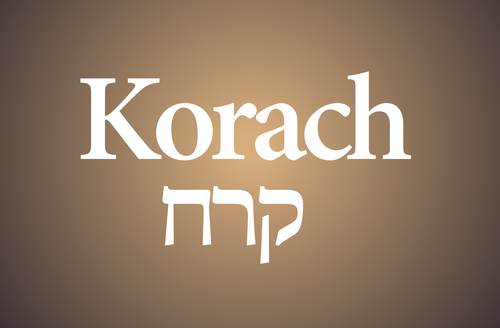Emotions and Desires
| Author | |
| Date Added | |
| Automatically create summary | |
| Summary |

This weekly study is dedicated to Bracha Malka Tank, a recent graduate of the Desert Torah Academy at the Chabad of Las Vegas. Mazal Tov on your reaching this milestone in your education and life. May you continue to be a source of Nachat and pride to your parents and grandparents.
Korach
Numbers 16:1 - 18:32
There are two rebellions this week. First, Korach, a Levite, was passed over for the leadership of his tribe and then challenges Moshe over the position of High Priest. No good rebellion can be "sold" as a means for personal gain, so Korach convinces 250 men of renown that they must stand up for a matter of principle -- that each and every one of them has the right to the office of High Priest (which Moshe had announced that G-d had already designated his brother, Aharon, to serve).
Fascinatingly, all 250 followers of Korach accept Moshe's challenge to bring an offering of incense to see who G-d will choose to fill the one position. This meant that every man figured he would be the one out of 250 to not only be chosen, but to survive the ordeal. Moshe announces that if the earth splits and swallows up the rebels it is a sign that he (Moshe) is acting on G-d's authority. And thus it happened!
The next day the entire Israelite community rises in a second rebellion and complains to Moshe, "You have killed G-d's people!" The Almighty brings a plague which kills 14,700 people and only stops when Aharon offers an incense offering.
To settle the question once and for all, Moshe has the head of each tribe bring a staff with his name on it. The next morning only Aharon's staff had blossomed and brought forth almonds. The people were shown this sign. Aharon's staff was placed in front of the curtain of the ark as testimony for all time.
* * *
How was it possible for Korach to rebel against Moses and defy his Divine commission? G-d said to Moses at Sinai:
"Behold! I come to you in the thickness of the cloud, so that people will hear as I speak to you, and they will also believe in you forever" (Exodus 19:9).
How could G-d's promise to Moses be negated?
We must understand the nature of the Divine promise. It is an axiom of Judaism that a person has moral free will and that G-d does not control or interfere with a person's freedom of choice. This means that a person is free to believe or not to believe in Moses, and G-d did not impose this belief on anyone.
G-d's promise to Moses was that Israel's belief in Moses will never be undermined by philosophical speculation. On a purely intellectual and philosophical level, Korach would not have doubted Moses. However, because he was vain and envious, his distorted thinking led him to erroneous conclusions.
We take great pride in our reasoning abilities. We should realize how sensitive these are and how easily they can be influenced by emotions and desires to lead us to false conclusions. Nowadays people are slaves of their own desires.
We must be an example (Light) for the human kind.
Kindness is a language the deaf can hear and the blind can see.
If you want one year of prosperity, grow grain. If you want ten years of prosperity, grow trees. If you want 100 years of prosperity, grow people.
One makes a living by what he gets; he makes a life by what he gives!
Shabbat Shalom!
Rabbi Ovadiah Tank
Online Learning
Rabbi Tank is a professor at the American Jewish College of New York where he teaches classes on Talmud, Chassidism, Jewish History, Contemporary Jewish Law and Jewish Music. Rabbi Tank is dedicated to finding modern usefulness and meaning in ancient wisdom texts, providing spiritual, cultural, social and educational programming for communities around the world.
Partners

Join Our Campaign
The wise man seizes the opportunity to do mitzvot" (King Solomon). The lazy person says -- someday I'll do it.
Fri, October 31 2025
9 Cheshvan 5786
Shalom ! שָׁלוֹם
Locations
- Manhattan, New York
- Deal, New Jersey
- Miami (Aventura), Florida
Today's Zimmanin
| Alot Hashachar | 6:02am |
| Earliest Tallit | 6:34am |
| Netz (Sunrise) | 7:25am |
| Latest Shema | 10:02am |
| Zman Tefillah | 10:54am |
| Chatzot (Midday) | 12:39pm |
| Mincha Gedola | 1:05pm |
| Mincha Ketana | 3:43pm |
| Plag HaMincha | 4:48pm |
| Candle Lighting | 5:36pm |
| Shkiah (Sunset) | 5:54pm |
| Tzeit Hakochavim | 6:36pm |
| More >> | |
Social
Subscribe
Sign up for free to receive weekly our newsletter. If you want to tell friends to receive our posts, type their emails to subscribers.

Privacy Settings | Privacy Policy | Member Terms
©2025 All rights reserved. Find out more about ShulCloud


